Premium Only Content
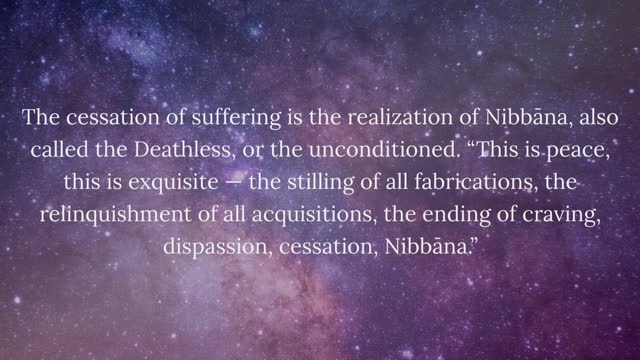
Buddhism: The Four Noble Truths
These are the Truths that the Buddha awakened to when he became enlightened.
The Four Noble Truths were the subject of the Buddhaʼs first dharma talk, and are the foundation of the teachings.
“Noble” (ariya) can mean universal or standard—i.e., different from personal truth. Or it can imply that these are “the truths of the Noble Ones”, or “ennobling truths”.
The First Noble Truth is there is suffering (dukkha).
Dukkha means physical and mental stress: sorrow, lamentation, pain, distress, and despair; association with the unloved; separation from the loved, and not getting what one wants. More subtly, dukkha is the overall unsatisfactoriness of conditioned phenomena (the Five Aggregates) because they do not provide lasting happiness.
Comprehending suffering is accomplished by observing it in a nonjudgmental, nonreactive way.
The Second Noble Truth is the cause of suffering is craving (taṇhā).
Craving has three aspects: Craving for sensual pleasure, for becoming (continued existence), and for non-becoming (annihilation).
Craving for becoming means the desire for the formation of states that are not currently happening, while craving for non-becoming means the desire for the destruction or halting of any states that are already occurring.
Craving is fueled by ignorance (avijjā)—blindness to suffering, to its cause and possible release, to the link between action and results, and especially to the construction of a self whose craving is to be satisfied.
Craving is the fuel that feeds the defilements (kilesa) of greed (lobha), hatred (dosa), and delusion (moha), which drive unskillful actions leading to more suffering.
The Buddha’s teaching on dependent origination (paṭicca samuppāda) is the most detailed explanation of the interlinked causal chain from ignorance to suffering.
The Third Noble Truth is there is an end to suffering.
Each time the mind lets go of some activity of clinging, the associated suffering ends.
The causes of suffering are unraveled by knowing and seeing the arising and passing away of the Five Aggregates: “Such is form, such is origination, such is disappearance. …feeling, … perception, …fabrications/formations… Such is consciousness, such is origination, such is disappearance.”
The cessation of suffering is the realization of Nibbāna, also called the Deathless, or the unconditioned. “This is peace, this is exquisite — the stilling of all fabrications, the relinquishment of all acquisitions, the ending of craving, dispassion, cessation, Nibbāna.”
Literally Nibbāna means “blowing out” or “extinguishing,” although Buddhist writings like to present it as “the absence of craving.”
The Pali and Sanskrit idiom characteristically appears in a verb form—“s/he nirvana-s,” indicating that nirvana is not a “thing,” but a process or experience: the experience of extinguishing the three fires of greed, hatred, and delusion.
The Fourth Noble Truth is the way leading to the end of suffering is the Noble Eightfold Path.
The eight “steps” of the path are developed integrally, not in a linear sequence. However, they are arranged in a supportive order: The initial wisdom of seeking freedom from suffering (Right View and Intention) leads to moral discipline and behavior (Right Speech, Action, and Livelihood), which support the development of meditation (Right Effort, Mindfulness, and Concentration). This hones the mind to achieve a penetrative understanding of the Four Noble Truths (Right View).
The Buddha offers many approaches to developing the path factors, suitable for many kinds of minds.
Source: https://www.imsb.org/wp-content/uploads/2014/09/FourNobleTruths.pdf
-
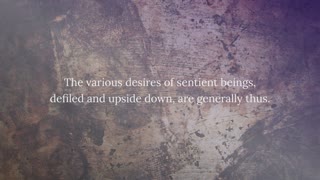 0:56
0:56
Buddhist Mind
4 years agoBuddhist Parable 33: Delusion
1671 -
 0:23
0:23
EntertainmentVideos
4 years agoBuddhism
12 -
 0:25
0:25
Notes from the Master’s Garden
4 years ago $0.01 earnedA Noble Plan
70 -
 0:31
0:31
Buddhist Mind
4 years ago $0.02 earnedBuddhism: 3 Characteristics in Everything
120 -
 2:46
2:46
Buddhist Mind
4 years agoAttaining Buddhahood | Buddhism
54 -
 9:37
9:37
Troy Wilson Ministries
4 years ago $0.01 earnedBible truths VS Bible misconceptions
2282 -
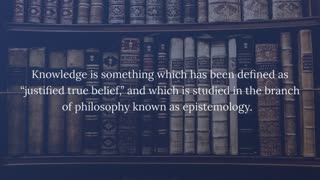 2:05
2:05
Buddhist Mind
4 years agoBuddhism: Knowledge vs. Wisdom
57 -
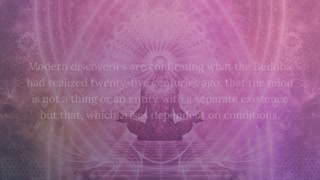 2:31
2:31
Buddhist Mind
4 years agoBuddhism: Nature of the Mind
641 -
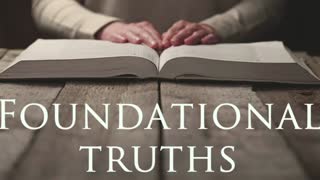 36:41
36:41
blakebuzz
4 years agoFoundational Truths part 3 - New Identity
154 -
 38:19
38:19
blakebuzz
4 years ago $0.01 earnedFoundational Truths part 2 - Practical Faith
190